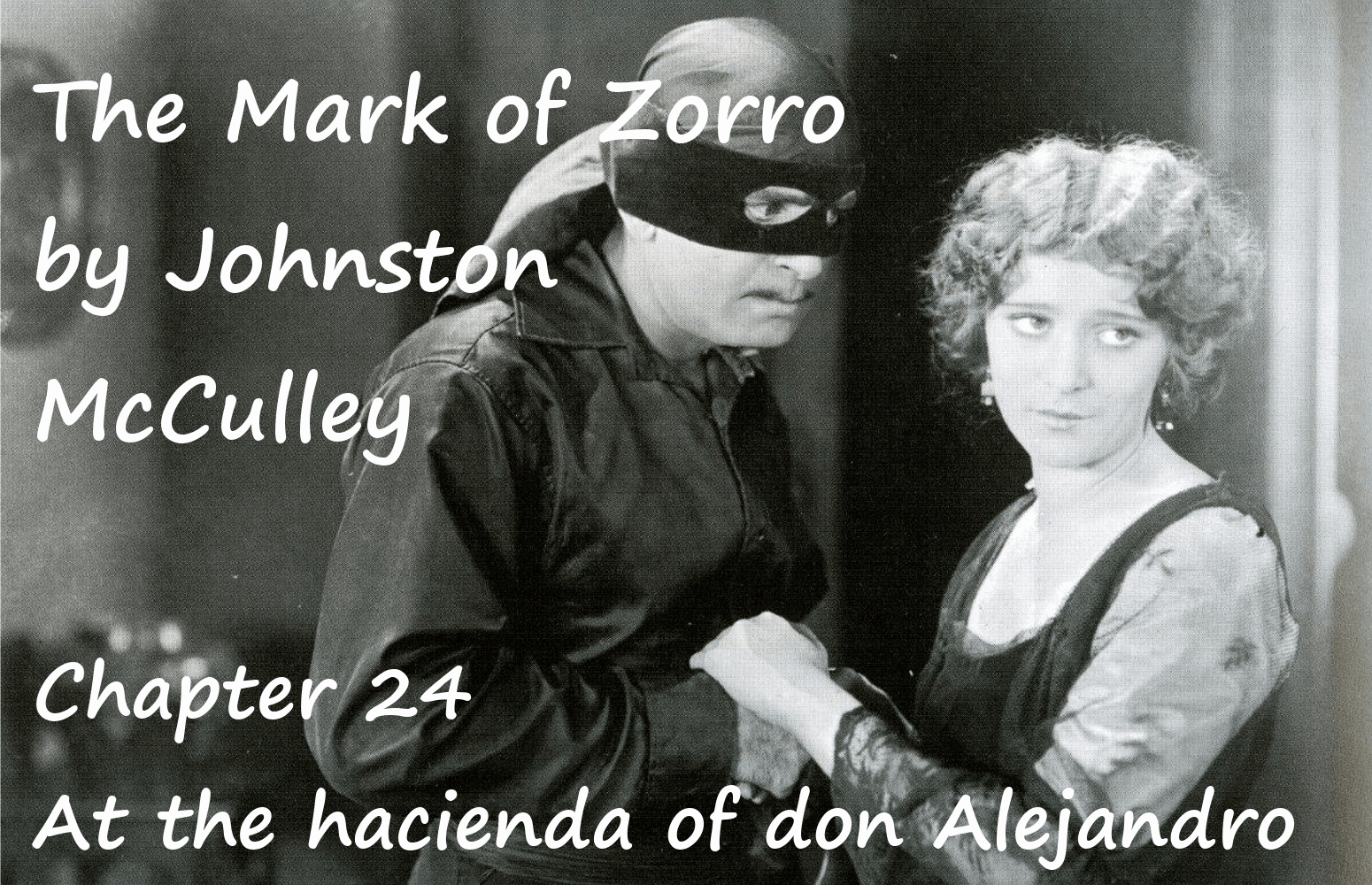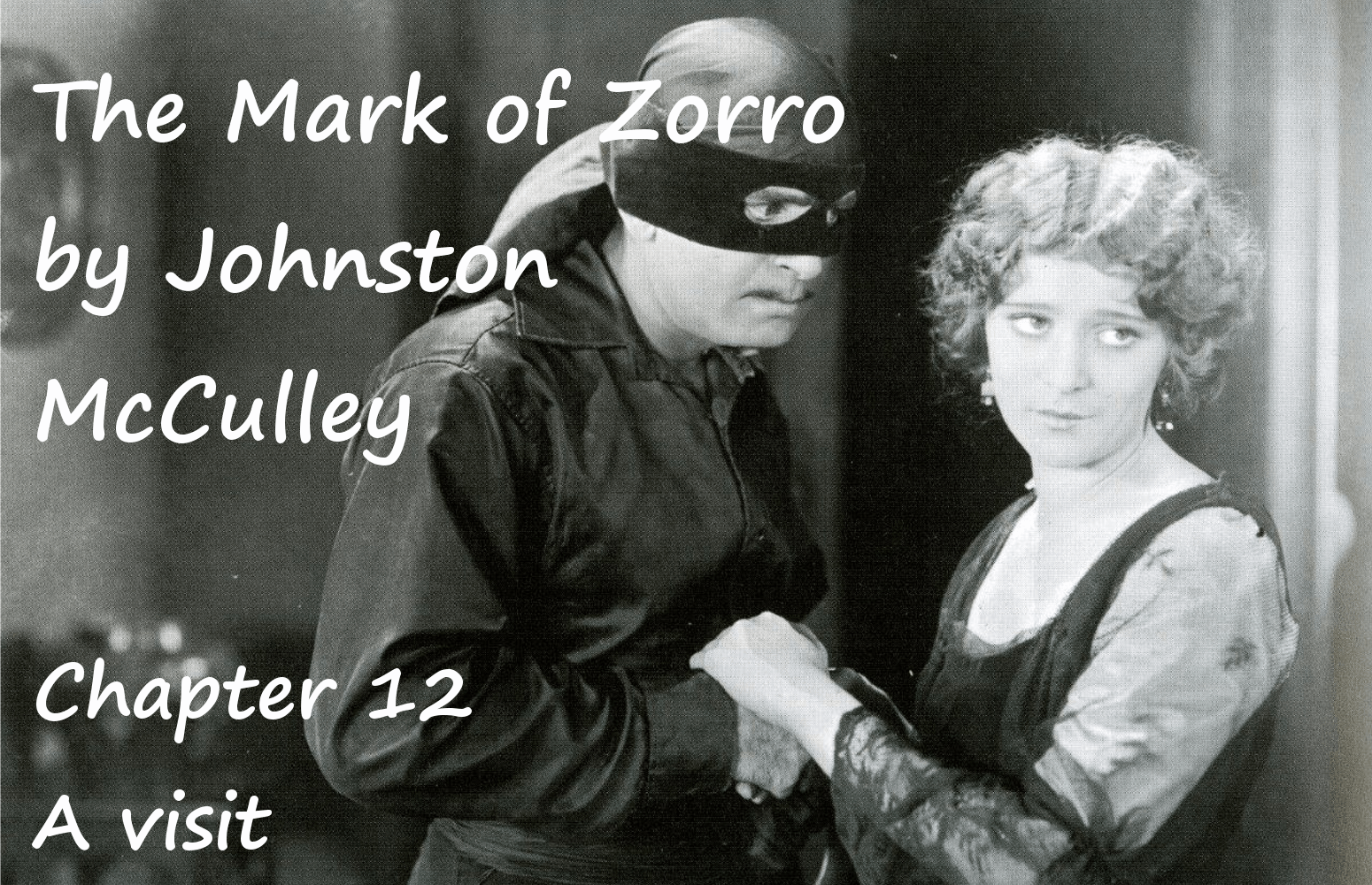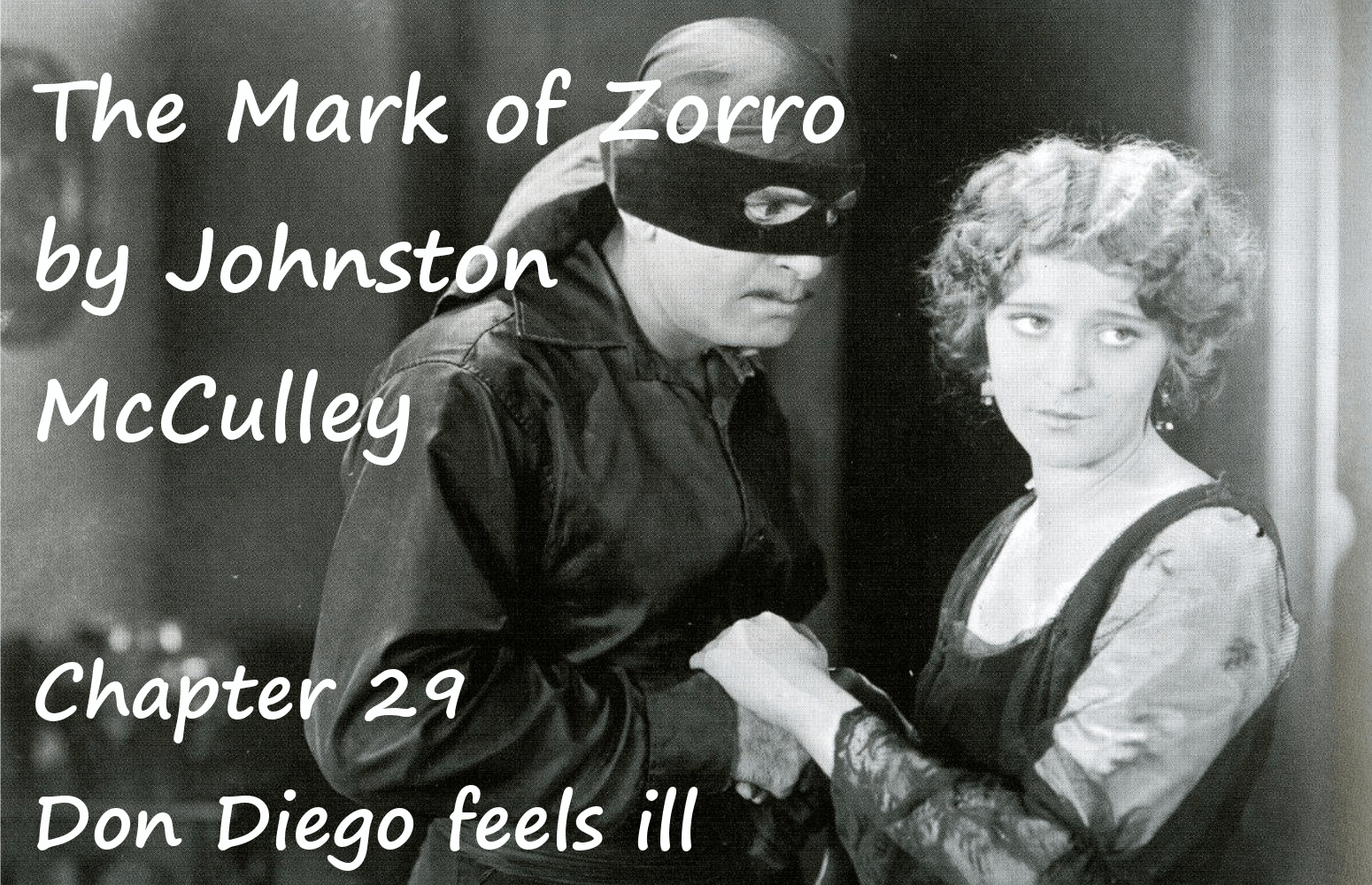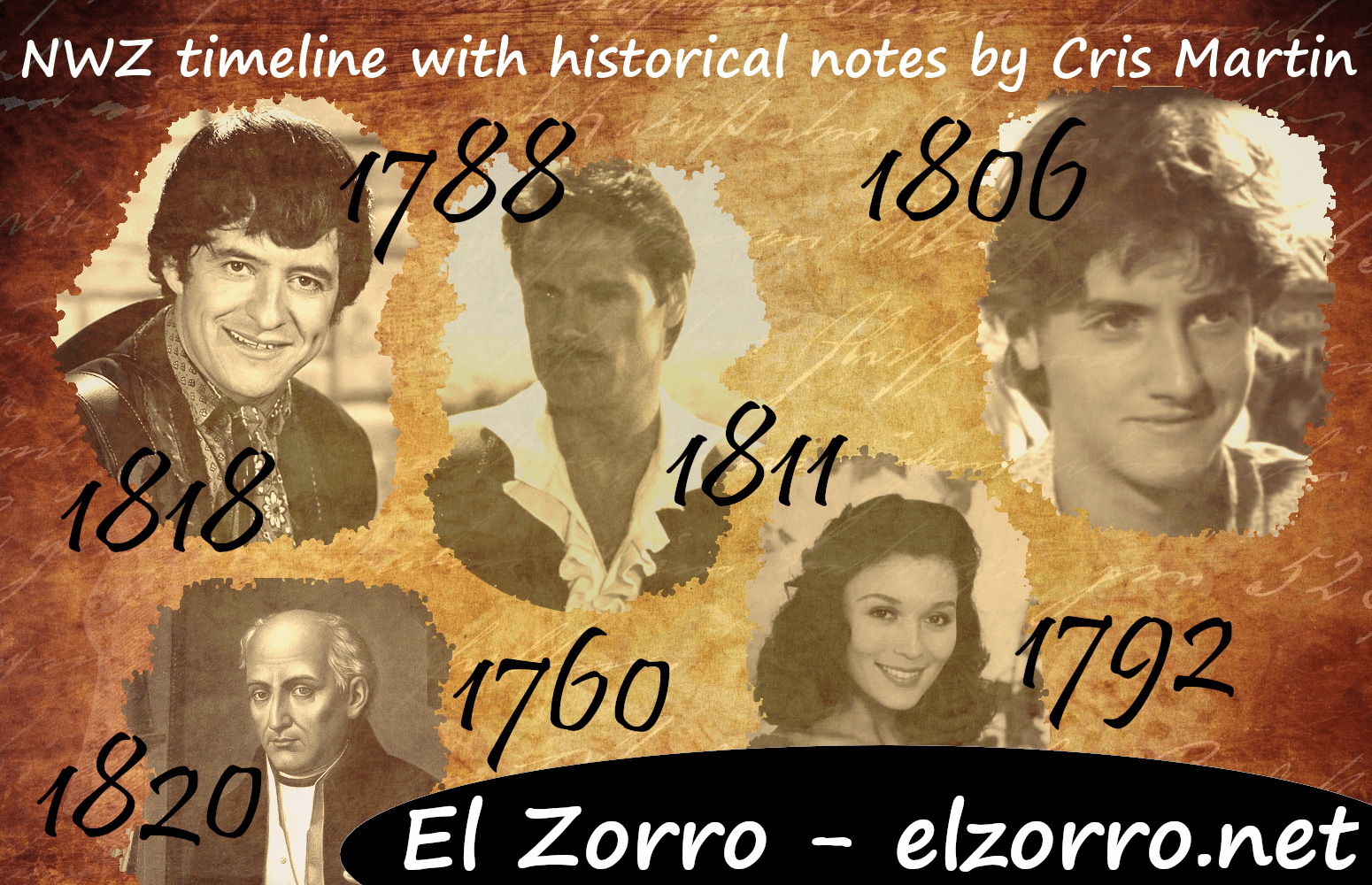The Mark of Zorro chapter 24 At the hacienda of don Alejandro
The Mark of Zorro chapter 24 At the hacienda of don Alejandro
Author McCulley, Johnston, 1883-1958
Title The Mark of Zorro
Note Published serially under the title: The curse of Capistrano.
Language English
Copyright Status Public domain in the USA.
Behind him he left a tumult in the town. The shrieks of the fat landlord had aroused the pueblo. Men came running, servants hurrying at their sides and carrying torches. Women peered from the windows of the houses. Natives stood still wherever they happened to be, and shivered, for it had been their dear experience that whenever there was a tumult natives paid the price.
Many young caballeros of hot blood were there, and for some time there had been no excitement in the pueblo of Reina de Los Angeles. These young men crowded into the tavern and listened to the wails of the landlord, and some hurried to the house of the magistrado and saw his wounds, and heard him declaim on the indignity that had been offered the law, and therefore his excellency the governor.
Captain Ramón came down from the presidio, and when he heard the cause of the tumult he swore great oaths, and sent his only well man to ride along the Pala Road, overtake Sergeant Gonzales and his troopers, and bid them return and take the trail, since at the time being they were following a false scent.
But the young caballeros saw in this circumstance a chance for excitement that was to their liking, and they asked permission of the comandante to form a posse and take after the highwayman, a permission they received immediately.
Some thirty of them mounted horses, looked to weapons, and set out, with the intention of dividing into three bands of ten each when they came to forks in the trail.
The townsmen cheered them as they started, and they galloped rapidly up the hill and toward the San Gabriel road, making a deal of noise, glad that now there was a moon to let them see the foe when they approached him.
In time they separated, ten going toward San Gabriel proper, ten taking the trail that led to the hacienda of Fray Felipe, and the last ten following a road that curved down the valley to the neighborhood of a series of landed estates owned by wealthy dons of the day.
Along this road Don Diego Vega had ridden some time before, the deaf and dumb Bernardo behind him on the mule. Don Diego rode with leisure, and it was long after nightfall when he turned from the main road and followed a narrower one toward his father’s house.
Don Alejandro Vega, the head of the family, sat alone at his table, the remains of the evening meal before him, when he heard a horseman before the door. A servant ran to open it, and Don Diego entered, Bernardo following close behind him.
“Ah, Diego, my son!” the old don cried, extending his arms.
Don Diego was clasped for an instant to his father’s breast, and then he sat down beside the table and grasped a mug of wine. Having refreshed himself, he faced Don Alejandro once more.
“It has been a fatiguing journey!” he remarked.
“And the cause for it, my son?”
“I felt that I should come to the hacienda,” Don Diego said. “It is no time to be in the pueblo. Wherever a man turns, he finds naught but violence and bloodshed. This confounded Señor Zorro—”
“Ha! What of him?”
“Please do not ‘Ha!’ me, sir and father. I have been ‘Ha’d!’ at from morning until night these several days. These be turbulent times.”
“This Señor Zorro has made a visit to the Pulido hacienda and frightened every one there. I went to my hacienda on business, and from there I went over to see old Fray Felipe, thinking I might get a chance to meditate in his presence. And who makes an appearance but a big sergeant and his troopers seeking this Señor Zorro!”
“They caught him?”
“I believe not, sir and father. I returned to the pueblo; and what think you happened there this day? They brought in Fray Felipe, accused of having swindled a dealer, and after a mockery of a trial they lashed him to a post and gave him the whip fifteen times across his back.”
“The scoundrels!” Don Alejandro cried.
“I could stand it no longer, and so I decided to pay you a visit. Wherever I turn, there is turmoil. It is enough to make a man insane. You may ask Bernardo if it is not.”
Don Alejandro glanced at the deaf and dumb native and grinned. Bernardo grinned back as a matter of course, not knowing it was no manner in which to act in the presence of a don.
“You have something else to tell me?” Don Alejandro asked his son, looking at him searchingly.
“By the saints! Now it comes! I had hoped to avoid it, father and sir.”
“Let me hear about it.”
“I paid a visit to the Pulido hacienda, and spoke with Don Carlos and his wife, also the Señorita Lolita.”
“You were pleased with the señorita?”
“She is as lovely as any girl of my acquaintance,” Don Diego said. “I spoke to Don Carlos of the matter of marriage, and he appeared to be delighted.”
“Ah! He would be!” said Don Alejandro.
“But the marriage cannot take place, I fear.”
“How is this? There is some shadow concerning the señorita?”
“Not to my knowledge. She appears to be a sweet and innocent maiden, father and sir. I had them come to Reina de Los Angeles and spend a couple of days at my house. I had it arranged so that she could see the furnishings, and learn of my wealth.”
“That was a wise arrangement, my son.”
“But she will have none of me.”
“How is this? Refuses to wed with a Vega? Refuses to become allied to the most powerful family in the country, with the best blood in the land?”
“She intimated, father and sir, that I am not the sort of man for her. She is prone to foolishness, I believe. She would have me play a guitar under her window, perhaps, and make eyes, and hold hands when her dueña is not looking, and all that silliness.”
“By the saints! Are you a Vega?” Don Alejandro cried. “Would not any worthy man want a chance like that? Would not any caballero delight to serenade his love on a moonlight night? The little things you term silly are the very essence of love. I doubt not the señorita was displeased with you.”
“But I did not see that such things were necessary,” Don Diego said.
“Did you go to the señorita in a cold-blooded manner and suggest that you wed and have it done with? Had you the idea, young sir, that you were purchasing a horse or a bull? By the saints! And so there is no chance for you to wed the girl? She has the best blood by far, next to our own.”
“Don Carlos bade me have hope,” Diego replied. “He took her back to the hacienda, and suggested that perhaps when she had been there a time and had reflected she might change her mind.”
“She is yours, if you play the game!” Don Alejandro said. “You are a Vega, and therefore the best catch in the country. Be but half a lover, and the señorita is yours. What sort of blood is in your veins? I have half a mind to slit one of them and see.”
“Cannot we allow this marriage business to drop for the time being?” Don Diego asked.
“You are twenty-five. I was quite old when you were born. Soon I shall go the way of my fathers. You are the only son, the heir, and you must have a wife and offspring. Is the Vega family to die out because your blood is water? Win you a wife within the quarter year, young sir, and a wife I can accept into the family, or I leave my wealth to the Franciscans when I pass away!”
“My father!”
“I mean it! Get life into you! I would you had half the courage and spirit this Señor Zorro, this highwayman, has! He has principles, and he fights for them. He aids the helpless and avenges the oppressed.
“I salute him! I would rather have you, my son, in his place, running the risk of death or imprisonment, than to have you a lifeless dreamer of dreams that amount to naught!”
“My father! I have been a dutiful son!”
“I would you had been a little wild—it would have been more natural,” Don Alejandro sighed. “I could overlook a few escapades more easily than I can lifelessness. Arouse yourself, young sir! Remember that you are a Vega.
“When I was your age, I was not a laughing-stock. I was ready to fight at a wink, to make love to every pair of flashing eyes, to stand up to any caballero in sports rough or refined. Ha!”
“I pray you, do not ‘Ha!’ me, sir and father. My nerves are on an edge.”
“You must be more of a man!”
“I shall attempt it immediately,” Don Diego said, straightening himself somewhat in his chair. “I had hoped to avoid it, but it appears that I cannot. I shall woo the Señorita Lolita as other men woo maidens. You meant what you said about your fortune?”
“I did!” said Don Alejandro.
“Then I must bestir myself. It would never do, of course, to let that fortune go out of the family. I shall think these matters over in peace and quiet to-night. Perhaps I can meditate here, far from the pueblo. By the saints!”
The last exclamation was caused by a sudden tumult outside the house. Don Alejandro and his son heard a number of horsemen stop, heard their calls to one another, heard bridles jingling and blades rattling.
“There is no peace in all the world!” Don Diego said, with deepened gloom.
“It sounds like half a score of men,” Don Alejandro said.
It was—exactly. A servant opened the door, and into the great room there strode ten caballeros, with blades at their sides and pistols in their belts.
“Ha, Don Alejandro! We crave hospitality!” the foremost cried.
“You have it without asking, caballeros. What manner of journey is this you take?”
“We pursue Señor Zorro, the highwayman.”
“By the saints!” Don Diego cried. “One cannot escape it even here! Violence and bloodshed!”
“He invaded the plaza at Reina de Los Angeles,” the spokesman went on. “He had the magistrado whipped because he sentenced Fray Felipe to receive the lash, and he whipped the fat landlord, and he fought half a score of men while he was about it. Then he rode away, and we made up a band to pursue him. He has not been in this neighborhood?”
“Not to my knowledge,” Don Alejandro said. “My son arrived off the highway but a short time ago.”
“You did not see the fellow, Don Diego?”
“I did not,” Don Diego said. “That is one stroke of good fortune that came my way.”
Don Alejandro had sent for servants, and now wine mugs were on the long table, and heaps of small cakes, and the caballeros began to eat and drink. Don Diego knew well what that meant. Their pursuit of the highwayman was at an end, their enthusiasm had waned. They would sit at his father’s table and drink throughout the night, gradually getting intoxicated, shout and sing and tell stories, and in the morning ride back to Reina de Los Angeles like so many heroes.
It was the custom. The chase of Señor Zorro was but a pretext for a merry time.
The servants brought great stone jugs filled with rare wine, and put them on the table, and Don Alejandro ordered that meat be fetched also. The young caballeros had a weakness for these parties at Don Alejandro’s, for the don’s good wife had been dead for several years, and there were no women folk except servants, and so they could make what noise they pleased throughout the night.
In time they put aside pistols and blades, and began to boast and brag, and Don Alejandro had his servants put the weapons in a far corner out of the way, for he did not wish a drunken quarrel, with a dead caballero or two in his house.
Don Diego drank and talked with them for a time, and then sat to one side and listened, as if such foolishness bored him.
“It were well for this Señor Zorro that we did not catch up with him,” one cried. “Any one of us is a match for the fellow. Were the soldiers men of merit he would have been taken long before this.”
“Ha, for a chance at him!” another screeched. “How the landlord did howl when he was whipped!”
“He rode in this direction?” Don Alejandro asked.
“We are not sure as to that. He took the San Gabriel trail, and thirty of us followed. We separated into three bands, each going a different direction. It is the good fortune of one of the other bands to have him now, I suppose. But it is our excellent good fortune to be here.”
Don Diego stood before the company.
“Señores, you will pardon me, I know, if I retire,” he said. “I am fatigued with the journey.”
“Retire, by all means,” one of his friends cried. “And when you are rested, come out to us again and make merry.”
They laughed at that; and Don Diego bowed ceremoniously, and observed that several scarcely could get to their feet to bow in return, and then the scion of the house of Vega hurried from the room with the deaf and dumb man at his heels.
He entered a room that always was ready for him, and in which a candle already was burning, and closed the door behind him, and Bernardo stretched his big form on the floor just outside it, to guard his master during the night.
In the great living-room, Don Diego scarcely was missed. His father was frowning and twisting his mustache, for he would have had his son like other young men. In his youth, he was remembering, he never left such a company early in the evening. And once again he sighed and wished that the saints had given him a son with red blood in his veins.
The caballeros were singing now, joining in the chorus of a popular love song, and their discordant voices filled the big room. Don Alejandro smiled as he listened, for it brought his own youth back to him.
They sprawled on chairs and benches on both sides of the long table, pounding it with their mugs as they sang, laughing boisterously now and then.
“Were this Señor Zorro only here now!” one of them cried.
A voice from the doorway answered him:
“Señores, he is here!”



